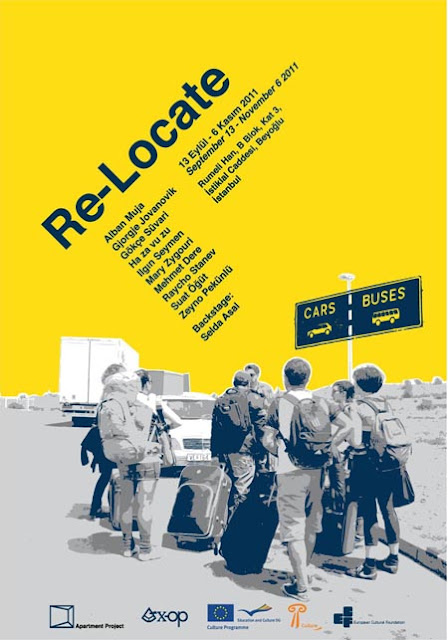Coğrafyalar-dışı Bir Birliktelik Nasıl Mümkün Olabilir?
Fırat ARAPOĞLU
Anadolu ve Balkanlar’da yaşanan mübadele döneminden yola çıkarak, “sınırlar”, “kültürel geçişlilikler”, “diyalog/diyalog eksiklikleri” gibi konular üzerinden bir seyahat programının deneyim çıktıları nasıl olabilir? Ya da diğer bir deyişle tarih, kimlik, coğrafya(sızlık) ve kültürel geçişlilik gibi konu(m)lar nasıl görünür hale getirilebilir? İşte bu temel sorulardan hareketle Apartman Projesi’nin X-OP AB Projesi’nin desteğiyle yaşama geçirdiği “Re-Locate” sergisi Beyoğlu’nda Rumeli Han’da izleyicilere sunuldu. Peki sadece bitmiş işler üzerinden değil, bir süreç okumasını da gerektiren sergiye yakından baktığımızda neler görülmekte?
Akışı Kes Akışı Kes
Balkanlara düzenlenen gezide yer alan sanatçılar arasında Mehmet Dere, Ha za vu zu, Suat Öğüt, Zeynp Pekünlü, Ilgın Seymen ve Gökçe Süvari bulunmakta (Süvari aynı zamanda etkinliğin Selda Asal ile birlikte koordinatörlüğünü de üstlenmiş). Projenin İstanbul ayağı içinse Gjorgje Jovanovik, Alban Muja, Raycho Stanev ve Mary Zygouri yer alıyor. Türkiye’den giden sanatçıların seyahat programını incelediğinizde Plovdiv, Atina, Üsküp ve Priştina’da kaldıklarını öğreniyorsunuz. Tüm bu yolculuk esnasında yaşananlar, lojistik konular, çalışma, seyahatta başa gelen olaylara dair Selda Asal’ın dairenin koridor duvarlarında ve mutfak kısmında sergilediği sahne arkası çekimleri, sergiyi gezmeden önce size gerekli olan harita bilgilerini sunuyor – Asal’ın deyimiyle “dokümantasyon dokümante ediliyor”.
Mehmet Dere’nin “Teneffüs” çalışması resmi tarihin okul kitaplarındaki temsilinin parodisini belirtmek üzere Lord Byron’un “sessizlik ve gözyaşları ile” mısrası ile birlikte sunulurken, Zeyno Pekünlü’nün hem Balkanlar ve Anadolu’daki evlilikler, ailesel kökler ve böylece köklerin karışımı üzerinden gerçekleştirdiği “Hairy Tale” başlıklı evlilik dokümantasyonu güzel ve etkili bir senaryo ile ilerliyor. Serginin mekana-özgü yerleştirilmesi ile en çok saklanan ama imgesel olarak fazlasıyla izleyiciyi kuşatan işi Ilgın Seymen’e ait: Mnemonics isimli çalışma sanatçının gittiği yerlerdeki topladığı materyallere ve görsel kültürel belleğe dayanıyor. Ha za vu zu’nun daha önce Rotterdam, Lyon ve İstanbul’da gerçekleştirdiği Akışı Kes performansı Plovdiv, Atina ve Priştina’da nispeten daha olaysız geçerken, Üsküp’te daha agresif bir tepki almış, bu da Ha za va zu’nun yorumuyla, aslında siyasal gerginlik ve iktidara gösterilemeyen tepkinin, sivil eylem üzerinden katılımcılara yansıtılmasına neden oluyor. Sırf bu tespitin araştırılması bile Ha za vu zu’nun ediminin başarısını ortaya koymakta.
Alban Muja, Raycho Stanev, Gjorgje Jovanovik ve Mary Zygouri dörtlüsünden akılda kalanlar ise son iki isme ait. Muja’nın işi diğer çalışmaların yanında temsili daha kapalı sunarken, Stanev’in multimedya yerleştirmesi yeni bir ses üretmiyor. Jovanovik’in desenlerinden oluşan “İstanbul Günlüğü” ve Zygouri’nin “Syntagma Hamamı” başlıklı Rum cemaati üzerine olan çalışmaları akılda kalıcı. Özellikle Zygouri’nin Türkiye ve Yunanistan arasındaki mübadele ve 1955 pogromu üzerinden günümüz politikalarına çok-cepheli sunduğu bakış, üzerine çok fazla düşünülecek malzeme vermekte.
Teslim Bayrağı Çekmek
Sergide yer alan iki ismi sona bırakmayı tercih etmemin nedeni, doğrudanlıkları ve akılda kalıcılıkları noktasında gösterdikleri açıklık yüzünden. Suat Öğüt’ün “Teslim Bayrağı Çekmek” çalışması, bu yıl Venedik’teki bayraksız bayrak direkleri ile dikkatleri çeken Latifa Echakhch’ın işine referans verirken, Türk, Makedon, Yunan, Bulgar ve Arnavut olmanın beş nedeni üzerinden yarattığı yerleştirme oldukça incelikli kimlik sorgulamarını haiz. Fıkra Projesi daha önce “Disco Disco Petrolium” çalışmasından gelişen “fıkralar” üzerinden karşılıklı toplumsal yargıları deşifre etmekte. Son olarak Gökçe Süvari’nin Atina’nın protestocu köpeği Loukanikos üzerinden görünür kıldığı “mit” sokakların ve eylem alanlarının varlığı yanında, sanki bu kahramanın havlamalarını duyacağımız bir yakınsama duygusu yaratak bir tür heroik durum yaratıyor.
Coğrafyalar-dışı bir deneyim alanı yer değiştirmeler ile mümkün kılınabilir ve Apartman Projesi’nin “Re-Locate” projesi bu deneyimi totolojik bir anlatıya dönüştürmeden tüm yalınlığıyla gözler önüne seriyor. Bu da bize Michel Foucoult, Gilles Deleuze ve Felix Guattari’nin “üretken olanın daima göçebe olan” olduğu tespitlerini hatırlatmış oluyor. Son olarak Apartman Projesi, 5533 gibi entegre piyasaya kafa tutabilen inisyatif sayısı çok az bir rakama inmişken bu tip alanların desteklenmesi ve ilgilenilmesinin önemini de hatırlatmış olalım. Re-Locate Proje Sergisi 6 Kasım’a kadar Beyoğlu Rumeli Han B Blok Kat 3’te izlenebilir.






















































